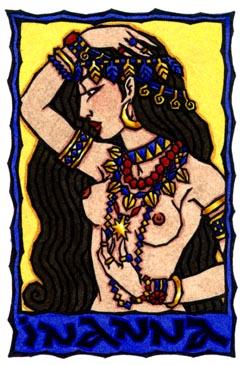The Charge of the Goddess is a poem written, or channeled, by Doreen Valiente. (The text I quote here is Starhawk's adaptation.) The Charge has much to say about the primacy of desire in human experience. For example,
Sing, feast, dance, make music and love, all in my Presence, for Mine is the ecstasy of the spirit and Mine also is joy on earth. For My love is law unto all beings.
Let My worship be in the heart that rejoices, for behold, all acts of love and pleasure are My rituals.
The Pagani tend to like a good time: feasting, drinking, dancing naked around bonfires, singing, drumming, dressing in costume, joking, pulling pranks. Oh, and the sex. Pagans, generally speaking, have sex-positive, libertarian, and libertine values around sex. Sex, like other expressions and experiences of embodiment, is a sacred part of our spirituality (sacred, that is, when it's not profane, if that's what turns you on).
But while we often emphasize the fun aspects of human embodiment--the acts of pleasure--a well-developed Wiccan thealogy, I believe, would also express the sacraments of our bodies sick and in pain; scarred from trauma or abuse; aging, dying. What matters is being present in our bodies, and that can be as difficult during acts of pleasure as it can be when we're in pain. A worthwhile practice for any Pagan, and really anyone at all, I believe, is to practice being present in one's own body. Such presence can be cultivated in various ways: breath work, body work, meditation, yoga, and ritual.
Sickness, pain, and death aren't signs of our fallen nature, as at least some versions of Christianity would have it. From a thealogical perspective, it doesn't make sense to long to be free from our bodies anymore than we long to be free of this earth. (And part of being Pagan, I believe, is to take pleasure in the earth, really to love it, know it, treat it with respect, and give thanks for its abundant gifts.) Reincarnation makes a lot of sense to me as an expression of Pagan thealogy; hey, we get to come back. Reincarnation with the hopeful goal of finally getting off the wheel, of being free from incarnation, makes no sense to me at all.
What then do we make of the final line of the Charge?
For behold, I have been with you from the beginning, and I am That which is attained at the end of desire.
Where is the end of desire? Does it happen in death? When we get to heaven? When we reunite with the oneness of the universe? When we reach enlightenment? When we're really lucky...and thank goddess we don't have to feel the tug of these human bodies anymore? Is the end of desire a desirable state, something we should pursue or at least look forward to? Desire seems essential to being human, in a body, and that is something we Pagani hold sacred. So why is the end something to be attained?




3 comments:
I would say that, like in Buddhism, the end of desire is that point in your consciousness when you can enjoy what is rather than looking forward to what will (or what may) be.
I'm leaning toward something like that myself, Jane. Perhaps the end of desire is that tenuous, sacred space in which we are at peace in the present. Not beyond this life, but in this life, moving/breathing in and out, suspended within the ebb and flow of longing.
My first thought was that the end of desire is when you find your way to the center of things. I'm not sure what that means, though.
Post a Comment